- Home
- Will Hobbs
Ghost Canoe Page 10
Ghost Canoe Read online
Page 10
As soon as the paddles floating on the surface were retrieved, the two canoes resumed the chase. By the time they caught up and tied on, all three of the canoes ahead of them had harpoons in the whale. The whale had slowed considerably. It was dragging twelve floats now and five canoes, and the wreckage of a sixth one.
The whale had strength yet. It sounded, but was soon back at the surface. It blew again, and tried to sound, and then towed them farther still to the west. Two more harpoons were added, and many more floats. The whale continued to beat the sea to froth with its struggles until its tail was all entangled with lines and floats. The Makahs waited patiently, knowing the whale was doomed now and would eventually exhaust itself.
Nathan wished it would end. The sun was setting, he couldn’t see the land any longer, and the whale was turning the ocean red from a number of deep gashes. Kwaddis, the great gray whale, had very little strength left.
At last the hunters thrust long, thin-shafted killing lances into the whale, trying for the spot that would kill it. The whale cried and moaned with a humanlike voice, as a human mother might moan, Nathan thought, in agony over a dead child. Then a Makah stepped from a canoe to the whale’s back and, with a deep-planted lance, found the place, which sent blood spouting high in the air from the whale’s blowhole. With a last convulsion, the whale rolled on its side, dead.
The man who had dealt the death blow was now swimming alongside the canoe. He was handed a bone awl and a coil of light line made of braided cedar. With dusk gathering, he dove under the water, and stayed down for a long time, perhaps a minute, before he surfaced, recovered his strength, and dove again. Nathan finally saw what he was doing—sewing the whale’s mouth shut so the whale wouldn’t fill with water and sink.
The five canoes began to tow the whale back to Neah Bay. Before long it was pitch dark, and Nathan had no idea where land was. But the Makahs knew, from the currents and from the stars.
Fearing for George’s life, Nathan paddled into the night. Paddling helped him keep from freezing. The crescent moon rose. He did his part to tow the immense dead weight of the whale toward the dim hulking shape of land. It became the longest night of his life. The sun was rising as the canoes neared the cliffs of Tatoosh and entered the Strait.
Lighthouse George was conscious now. Somebody helped him sit up. But something was wrong with him. George didn’t recognize Nathan. Nathan didn’t think he recognized anybody, and he couldn’t move his left leg. He didn’t seem to have any pain in the leg; it seemed he couldn’t feel it at all.
Nathan could see his father on the catwalk of the lighthouse with a spyglass, and waved to him. His father waved back. His father wouldn’t know anything was wrong.
The five canoes towed the whale into Neah Bay on the afternoon’s high tide. Nathan had never felt so weary in his life. They were met at the beach by hundreds of villagers singing to welcome the whale. Lighthouse George, carried out of the canoe and laid flat on the bearskin cape on the beach, couldn’t recognize Rebecca.
Young Carver was called, the man who made the canoes. He probed George’s lifeless leg and looked into his eyes. Old Jefferson listened as George’s crew pointed to Dolla Bill, who was walking away toward the trading post. With much acting out, they told how Dolla Bill had suddenly emerged from the float during the whale hunt, and how Lighthouse George had spared his life.
Jefferson glanced over to the trading post porch, where Dolla Bill had joined Jack Kane. Much excited, Dolla Bill seemed to be conveying his exploits to his new employer. Nathan wondered if Jefferson was going to pronounce judgment on Dolla Bill, but the old chief said nothing other than “Skookum-man.” It seemed that since George had already spared his life, Dolla Bill wasn’t going to have to answer to a lesser sentence.
Hundreds of people pulled on ropes and, bit by bit, worked the massive body of the whale up onto the beach. Its head was sprinkled with eagle down and it was honored with more singing and ceremony.
The harpooner who had struck first opened up the whale first. Soon men were pulling sections of blubber from the midsection of the whale. The blubber was heavy and slippery—it looked like the men were trying to pull five-hundred-pound blankets off a bed.
Lighthouse George could talk, but he still couldn’t recognize Rebecca or anyone else. Young Carver had a number of men lift George into one of the small canoes and carry him up to bed in his longhouse.
15
The King and His Fool
Even though he was close to the carcass, Nathan watched the last of the butchering as if from a distance. He felt lost without Lighthouse George. He tried to help Rebecca carry away her share of the blubber and the gelatinous red flesh underneath, but she shooed him away. The quick laughter from all the other women working on the carcass made him feel foolish for inviting himself into the women’s domain.
He went to George’s bed behind the partition in his corner of the longhouse and found him lying on his back, with eyes open and staring aloft. George wasn’t looking at the huge beams or the strips of fish and seal meat hanging from the rafters; he wasn’t looking at anything. “How are you feeling, George?” Nathan asked.
His friend’s dark eyes took Nathan in, but showed no recognition. Lighthouse George went back to staring into the rafters.
“It’s me, Tenas Mac. It’s Yaw-ka-duke, your partner.”
When George didn’t reply, Nathan sat with him without speaking, and finally he wandered back to the whale. Screaming seagulls by the hundreds and hundreds, along with the ravens, were cleaning up the dregs of the butchering and picking at the bones of the massive, reddish skeleton. The Makahs had taken all the bone they needed, as well as all the whale’s sinew—and even its stomach, bladder, and intestines for use as bags to store food or oil.
Nathan checked in on his mother, and was surprised to find her in bed. “I’ve just taken cold,” she said, “but I don’t think I should teach any sewing for a few days. Tell them at the Agency….”
“I will,” he agreed.
He must have let his disappointment show, and even the fear that had quickly chilled his heart. “Don’t worry,” she assured him. “I’ll be over this in a few days. I’m just so upset with myself. Here you’ve taken a swim in the Pacific Ocean, and you’re evidently healthy as a horse.”
“I am, Mother,” he assured her.
“But promise me that was the last of your whale-hunting career.”
“I can’t believe how brave the Makahs are,” he replied.
“You have as much courage as they do. And you love the wild, wide ocean, just like your father. But all the same, for my sake…”
“I’ll promise, Mother, if you’ll promise to get well once and for all.”
“I will, Nathan, I will. They keep saying at the Agency that the doctor from Port Townsend is going to visit in Neah Bay to see patients. I’ve written; he’s sending some medicine.”
“I’m so afraid for Lighthouse George, and Rebecca.”
“An injury to the head, like his, could take time.”
“Will he get better?”
“He might, but he might not. All we can do is pray for him, I’m afraid.”
“I’m going to the store to get you tea and sugar. I’ll warm you some milk, too.”
As Nathan approached the trading post, he found several Makah women with empty baskets waiting on the porch, confused about whether they should go in. He could hear the sound of laughter inside and what sounded like the whirring of thrown knives.
He was right about the knives. As he opened the screen door and stepped inside, he saw two enormous knives quivering in the wall down at the end of the long counter. Kane was pulling his from the bull’s-eye he had chalked onto the wall, and Dolla Bill was cackling with glee. “Whale man!” Dolla Bill shouted as he spied Nathan. “What you like? Everything for sale!”
Nathan’s eyes went from Dolla Bill to Kane. The Panama hat and the white suit and shoes were gone; Kane had found trousers, boots, and a coarse blue
cotton shirt in the store. Nathan was struck by the man’s physical presence. Though he wasn’t especially tall, his shoulders were extraordinarily wide, and he was narrow at the hip.
“Come in, Nathan,” Kane said with a friendly smile. The man strode the length of the counter with the confidence and grace of a lion. He hadn’t shaved in several days, and his thick stubble was dark in contrast to his golden hair. The man’s voice was mild and warm, as ever, his bright blue eyes full of care. “How’s your mother? She’s quite sick, you know. You should take care of her better.”
“That’s why I’m here,” Nathan said. “To get some things for her. Tea and sugar.”
“Good, good. I’m happy to hear it.”
Down at the end of the counter, Dolla Bill pulled another knife from the display case and began to juggle the three of them. Nathan was awed by his dexterity: one slip and the results would be bloody. The bone handle of one of the knives, Nathan noticed, was decorated with an engraving of a ship, either a clipper ship or a steamer outfitted with sails, he couldn’t tell which.
He remembered, vaguely, hearing something not so long ago about a knife with a clipper ship design on its grip. His thoughts jumped to his father’s upcoming birthday. For a moment he thought of the knife as a possible gift, if the ship was indeed a clipper and not a steamer. But the knife would be expensive, and his father didn’t like the kind of presents that cost money, anyway.
“There are some women out on the porch,” Nathan said to the new trader, with one eye on the knives in motion. “I think they don’t know if they should come in or not.” He said it lightly, as if Kane hadn’t noticed they were there. It seemed unlikely that Kane hadn’t. Nathan was determined to make friends with the new trader and to avoid saying anything that might be taken amiss.
“Well, of course they should come in,” Kane said with a warm smile, waving to the women. “We’re in business, aren’t we, Bill?”
“Business!” the outcast shouted.
The Makah women, watching the magician through the screen door, made no move to come inside. “I’m not sure they trust Dolla Bill,” Nathan whispered.
“Did you see his trick on the Indians’ little whaling expedition?” Kane asked.
“I was in the same canoe. He’s lucky they didn’t kill him.”
“A tragic misunderstanding—he thought they would love him for it. They had admired his previous work, and this was his greatest trick.”
Dolla Bill, while juggling the knives, had overheard. Tears were streaming from his eyes.
“His feelings were terribly hurt,” Kane explained. “Like many great artists, Dolla Bill is a misunderstood soul.”
Nathan wondered if Kane was joking. It didn’t seem so. Why should he defend Dolla Bill? “Dolla Bill acts crazy,” Nathan whispered across the counter.
With a smile, Kane said, “No more than the king’s fool in Shakespeare’s plays. Do you read Shakespeare?”
“My mother does.”
“Then she would understand that the fool’s nonsense is actually the truth. You see, Dolla Bill is not only a magician and a contortionist, but a philosopher as well.”
“A philosopher?” Nathan repeated. Kane seemed such a man of the world, so intelligent. Perhaps it took a genius to recognize a genius.
Three women came inside. From their baskets, they brought out eight sla hal sets among them—sixteen of the bones—and put them on the counter. Kane paid them with a twenty-dollar gold piece, and they left. Nathan was amazed at the price.
Dolla Bill picked up one of the unmarked sla hal pieces. He studied the cylinder for a few moments, then twisted it in opposite directions. It pulled apart. Dolla Bill looked disappointed, as if he’d been looking for something to fall out.
Nathan commented, “I didn’t know they were hollow.”
“Some of them are,” Kane said. The new trader took the two sections of the bone piece from Dolla Bill and fitted them back together with a twist. “Look how cleverly they’re made, Nathan. You can barely see the joints even if you’re looking for them.”
“A dollar-and-some for one of those seems like a lot of money,” Nathan said.
“Not really,” Kane replied confidently, and he opened a cabinet that was behind the counter. Nathan saw dozens of sla hal pieces inside.
“Do you think they’re valuable?” Nathan asked. He was already thinking where he could acquire two, and make a little money, but he instantly rejected the idea of robbing a grave. “Captain Bim paid for bricks from the bakery of the old Spanish fort.”
Kane laughed contemptuously. “Who cares about bricks? These bone game pieces are unique works of art! I think collectors will be very interested in them. Do you know of any more?”
Nathan hesitated, just a second. “No,” he answered.
Dolla Bill sprang forward with a devilish smile. “Tenas Mac not tell the truth.”
“Not any that are mine,” Nathan added quickly, surprised that Dolla Bill had read him so easily. And then he explained, “Lighthouse George has a pair.”
Dolla Bill brought his pocked, scarred face inches from Nathan’s face, and stared. “Still not tell the truth!” he sang, and then he danced away.
Kane was scrutinizing Nathan with his piercing blue eyes. Suddenly he quit. “For you, three dollars a pair,” Kane said with a smile. “That’s good money. See if you can find us some. How much did Bim pay for a brick?”
“Two bits.”
Nathan considered the idea of the bone pieces as art. Surely they were ingenious, and they had a certain beauty, but Kane hadn’t been around long enough to see all the other things the Makahs made that were even more artistic.
“What about carved cedar boxes?” he suggested. “Those are works of art. The wood is perforated where the joints are going to be, but not all the way through. When they steam the cedar and bend it, there’s not even a joint. That’s why they’re waterproof. Collectors should like that, and especially with all the designs that are carved on the outside. What about masks? The Makahs have masks all over the place. And they could make more….”
Kane held up his hand. “Right now I’ll just start with the sla hal pieces. It’s the bone game that’s caught my fancy. Those other things…yes, they’re beautiful, and maybe people will want them. One step at a time. If the bone game pieces sell as well as I think they will, in cities like New York and London and Paris, then we’ll have prepared the market for the rest, which will be much more difficult and expensive to ship.”
“What about the canoes?” Nathan said, wondering aloud. “The canoes are the most beautiful works of art of all.”
“I like you,” Kane said. “You don’t think small. Maybe we can sell some of the canoes to museums.”
“Oh, I don’t want to sell them.”
“Why not?”
“I don’t know. I was just trying to figure out your business, I guess.”
“Well, there’s got to be more to it than selling tea and sugar. Bill, let’s take care of our customer.” The new trader laughed, as if he’d said something funny, then added, “Another day, another dollar.”
Nathan went back home with a sense of unease. It was difficult to comprehend Kane. He was so dazzling, so self-assured, so knowledgeable, yet it didn’t seem he’d chosen the sort of business that would suit him.
He remembered Dolla Bill taking one of the sla hal pieces apart as soon as the women brought them in. Dolla Bill had been looking for something inside.
Had he really been looking for something, or merely entertaining himself?
In the evening, Nathan told his mother all about Kane’s idea of selling the bone game pieces as art.
She listened carefully, and then she said, “People in New York and London and Paris are known for driving up the prices of the latest thing that’s fashionable. I suppose that artifacts from the Indians of the last remote tip of America might strike their fancy. Conceivably, they might even start playing the bone game as a new form of gambling.”
“Maybe so,” Nathan agreed. “Kane is a smart man. He must know something.”
“Smart, but not kind,” his mother said pointedly. She coughed a bit, then reached for her tea. “Kane has raised the prices on everything, even food. I don’t understand it. The agent sees no fault in it; they’ve become fast friends.”
After his mother had gone to bed, Nathan sat up trying to make sense of it all. He kept thinking about everything he had seen and heard in the store that day. Suddenly he remembered who had spoken of an engraving of a ship—a clipper ship—on the bone handle of a knife. Captain Bim had! Such a knife was one of the items stolen from the trading post several months before!
Instantly, Nathan’s mind was racing. Was it a clipper ship on the grip of the knife Dolla Bill had been juggling in the store? If it was a clipper ship, then it must be Dolla Bill who’d robbed the trading post! No one had suspected him because he’d arrived weeks after the robbery, on the Anna Rose. But what if he’d been in Neah Bay earlier, in hiding? What if he’d been the one who made the footprints? What if he’d been aboard the Burnaby?
It was easy enough to imagine Dolla Bill, so skillful with knives, putting one in Captain Flagg’s heart.
But why?
In the morning Nathan had a perfect reason for going back to the trading post. His mother was going to bake, and she needed flour and more sugar.
Dolla Bill was by himself. The Makahs seemed to be staying away. The magician was standing on a foot-ladder and suspending a wicker cage from a hook in the ceiling. Two large white chickens were clucking anxiously inside, as if they were concerned by seeing Dolla Bill’s face close up.
“Hello, Tenas Mac,” Dolla Bill called cheerfully as Nathan came through the door. “You like my parrots?”
“Yes indeed,” Nathan said, eyeing the chickens. “Have you taught them to talk?”
With a grin, Dolla Bill said, “Teach them to die, maybe.”

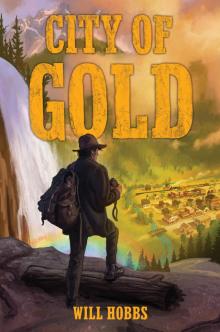 City of Gold
City of Gold Kokopelli's Flute
Kokopelli's Flute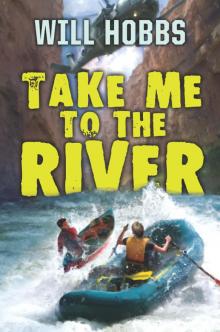 Take Me to the River
Take Me to the River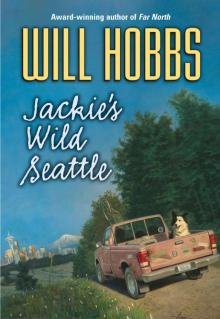 Jackie's Wild Seattle
Jackie's Wild Seattle The Maze
The Maze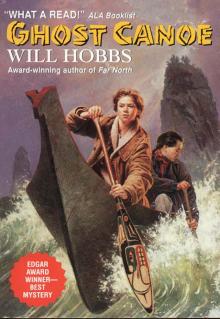 Ghost Canoe
Ghost Canoe Never Say Die
Never Say Die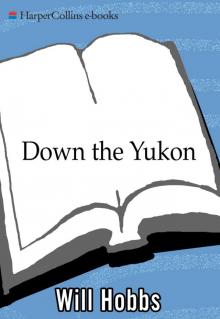 Down the Yukon
Down the Yukon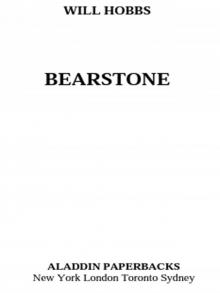 Bearstone
Bearstone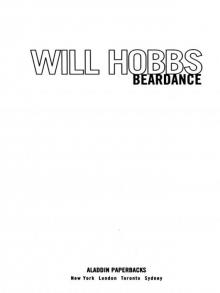 Beardance
Beardance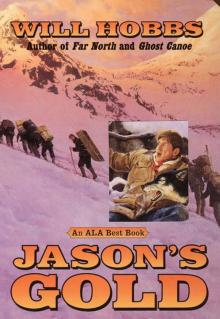 Jason's Gold
Jason's Gold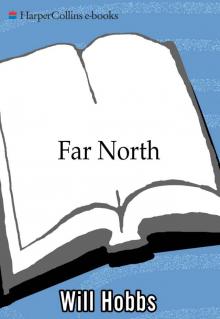 Far North
Far North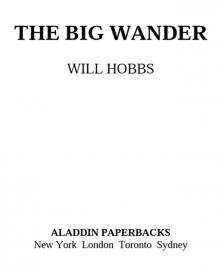 The Big Wander
The Big Wander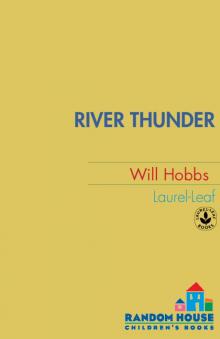 River Thunder
River Thunder Downriver
Downriver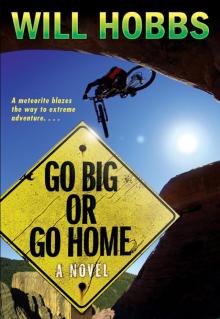 Go Big or Go Home
Go Big or Go Home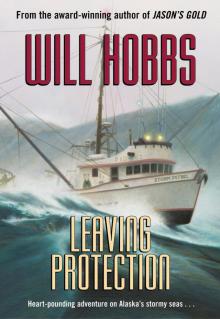 Leaving Protection
Leaving Protection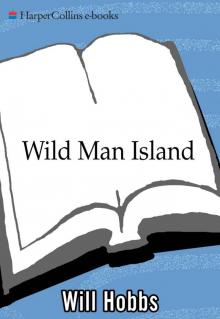 Wild Man Island
Wild Man Island